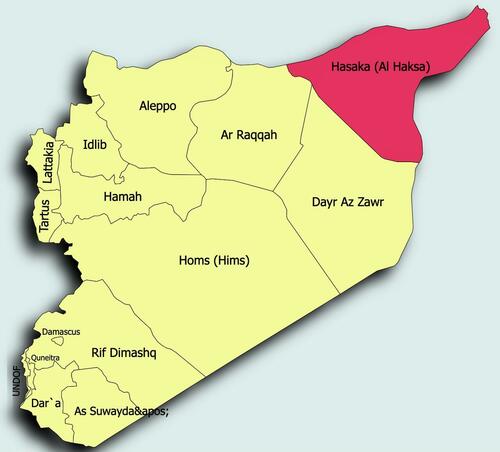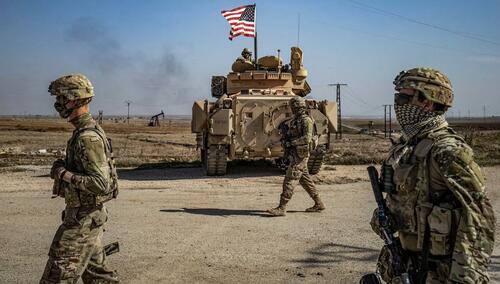
The United States struck Iranian-linked groups in Syria on Thursday after a US contractor was killed and five military service members and another US contractor were wounded in a purported drone strike.
The Pentagon said the US casualties were suffered on a base near Hasakah in the northeast part of the country, when a "one-way, unmanned, aerial vehicle" hit a maintenance facility at 1:38 pm local time. The statement said intelligence assessed the drone to be "of Iranian origin."
Three service members and the surviving U.S. contractor were medically evacuated to military medical facilities in Iraq. Two service members were treated at the base. No details were provided about which military branches the service members were affiliated with, nor the identity of the contractors.

"At the direction of President Biden, I authorized U.S. Central Command forces to conduct precision airstrikes tonight in eastern Syria against facilities used by groups affiliated with Iran’s Islamic Revolutionary Guards Corps (IRGC)," said Secretary of Defense Lloyd J. Austin III in a statement. "The airstrikes were conducted in response to today’s attack as well as a series of recent attacks against Coalition forces in Syria by groups affiliated with the IRGC."
The violence came on the same day as reports that Syria and Saudi Arabia are on the brink of fully restoring diplomatic relations -- to include reopening embassies. As we wrote just yesterday:
It seems the Gulf has been willing to recognize that the Syrian government won the decade-long war and move on, but not Washington. The US has continued its military occupation of northern Syria, and Israel has extended its bombing campaign, even this week with strikes on Aleppo international airport.
The violence also comes alongside a Chinese-brokered rapprochement between Saudi Arabia and Iran, which will see the long-time archrivals restore full diplomacy. An aide to Israeli Prime Minister Netanyahu, disappointed over the prospect of more peaceful relations between Saudi Arabia and Iran, said it was the result of American "weakness."

In August of last year, US helicopters attacked Iranian-linked militants in Syria after rockets were fired at US bases.
In separate statement on Thursday's events, US Central Command said, "Our troops remain in Syria to ensure the enduring defeat of ISIS, which benefits the security and stability of not only Syria, but the entire region."
To keep the wheat and oil out of the hands of the government and its allies. Oh, I mean protect our allies the Kurds from our allies the Turks and fight ISIS and their enemies, Iran.
— Scott Horton (@scotthortonshow) March 24, 2023
Officially, about 900 US service members are deployed in Syria, against the wishes of the Syrian government. The presence dates back to 2015, with successive administrations claiming the deployments are legal under the aging 2001 and 2002 Authorizations for Use of Military Force (AUMFs). The first authorized force against the perpetrators of 9/11, and the second authorized the disastrous invasion of Iraq.
Earlier this month, the House rejected a resolution that would have directed President Biden to withdraw U.S. troops within 180 days. Introduced by Florida Republican Rep. Matt Gaetz, it failed in a 103-321 vote. Both the yea and nay votes were highly bipartisan; 56 Democrats joined 47 Republicans in calling for troops to leave.
In a 9-86 vote on Wednesday, the Senate killed an amendment offered by Sen. Rand Paul that would have put a six-month sunset on the 2001 AUMF. "No one in Congress in 2001 believed they were voting for a decades-long war fought in at least 19 countries," wrote Paul at Responsible Statecraft, noting that the six-month window would give Congress time to debate "where and how to authorize force."
The United States struck Iranian-linked groups in Syria on Thursday after a US contractor was killed and five military service members and another US contractor were wounded in a purported drone strike.
The Pentagon said the US casualties were suffered on a base near Hasakah in the northeast part of the country, when a “one-way, unmanned, aerial vehicle” hit a maintenance facility at 1:38 pm local time. The statement said intelligence assessed the drone to be “of Iranian origin.”
Three service members and the surviving U.S. contractor were medically evacuated to military medical facilities in Iraq. Two service members were treated at the base. No details were provided about which military branches the service members were affiliated with, nor the identity of the contractors.

“At the direction of President Biden, I authorized U.S. Central Command forces to conduct precision airstrikes tonight in eastern Syria against facilities used by groups affiliated with Iran’s Islamic Revolutionary Guards Corps (IRGC),” said Secretary of Defense Lloyd J. Austin III in a statement. “The airstrikes were conducted in response to today’s attack as well as a series of recent attacks against Coalition forces in Syria by groups affiliated with the IRGC.”
The violence came on the same day as reports that Syria and Saudi Arabia are on the brink of fully restoring diplomatic relations — to include reopening embassies. As we wrote just yesterday:
It seems the Gulf has been willing to recognize that the Syrian government won the decade-long war and move on, but not Washington. The US has continued its military occupation of northern Syria, and Israel has extended its bombing campaign, even this week with strikes on Aleppo international airport.
The violence also comes alongside a Chinese-brokered rapprochement between Saudi Arabia and Iran, which will see the long-time archrivals restore full diplomacy. An aide to Israeli Prime Minister Netanyahu, disappointed over the prospect of more peaceful relations between Saudi Arabia and Iran, said it was the result of American “weakness.”

In August of last year, US helicopters attacked Iranian-linked militants in Syria after rockets were fired at US bases.
In separate statement on Thursday’s events, US Central Command said, “Our troops remain in Syria to ensure the enduring defeat of ISIS, which benefits the security and stability of not only Syria, but the entire region.”
To keep the wheat and oil out of the hands of the government and its allies. Oh, I mean protect our allies the Kurds from our allies the Turks and fight ISIS and their enemies, Iran.
— Scott Horton (@scotthortonshow) March 24, 2023
Officially, about 900 US service members are deployed in Syria, against the wishes of the Syrian government. The presence dates back to 2015, with successive administrations claiming the deployments are legal under the aging 2001 and 2002 Authorizations for Use of Military Force (AUMFs). The first authorized force against the perpetrators of 9/11, and the second authorized the disastrous invasion of Iraq.
Earlier this month, the House rejected a resolution that would have directed President Biden to withdraw U.S. troops within 180 days. Introduced by Florida Republican Rep. Matt Gaetz, it failed in a 103-321 vote. Both the yea and nay votes were highly bipartisan; 56 Democrats joined 47 Republicans in calling for troops to leave.
In a 9-86 vote on Wednesday, the Senate killed an amendment offered by Sen. Rand Paul that would have put a six-month sunset on the 2001 AUMF. “No one in Congress in 2001 believed they were voting for a decades-long war fought in at least 19 countries,” wrote Paul at Responsible Statecraft, noting that the six-month window would give Congress time to debate “where and how to authorize force.”
Loading…





